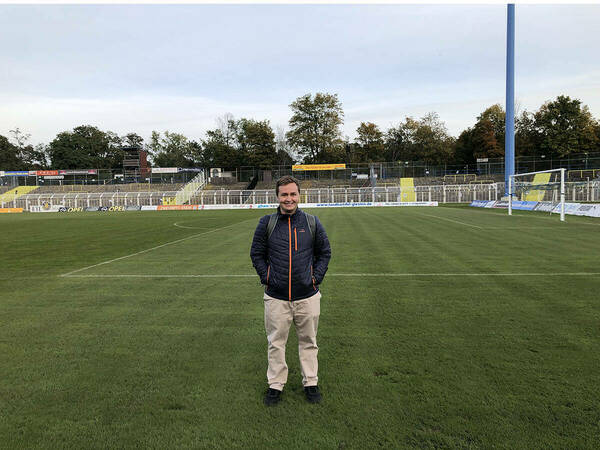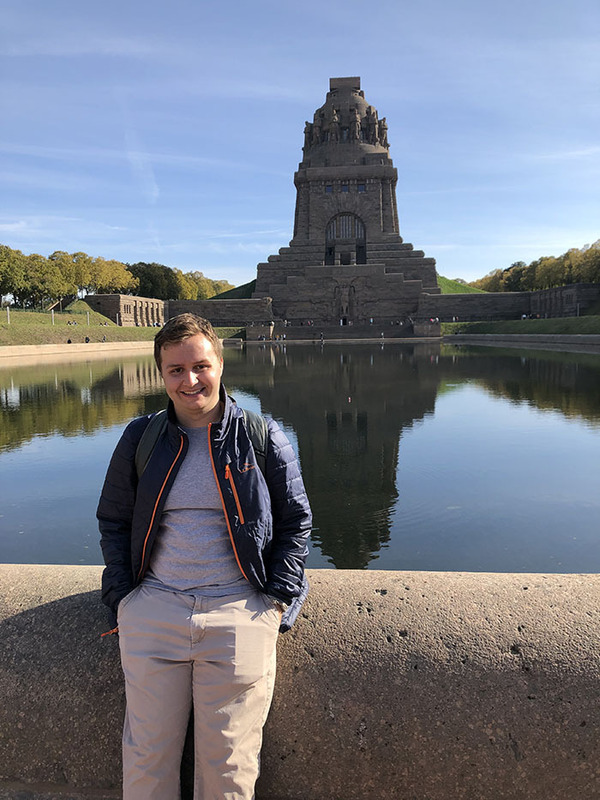
Joey Speicher ’22 received a Fall Break 2021 research grant from the Nanovic Institute for European Studies to conduct research in Germany for his senior thesis on football (soccer) and the German far-right since 1989. A double major in political science and English with a minor in European Studies, Joey visited the cities of Berlin and Leipzig. In this article from Nanovic Navigator, he shares his thoughts on what proved to be a transformational experience.
My love affair with European football—known in the United States as soccer—is, at this point, fairly extensive. By now, it has stretched into its second decade and shows no sign of abating. In some ways, I suppose I view the world through the lens of football, and yet, through all my time following the sport, I have never been able to satisfactorily answer one question: why does something that is quite literally “just a game” matter so much to its fans? As a long-time fan of Notre Dame football, I am well aware of how much sports can mean to individuals and communities. But, I was still struck by the intensity of the devotion fans have toward European football, particularly in the ways this devotion intersects with politics. I knew that this was something I wanted to research further.
My decision to focus on Germany came from a desire to answer another seemingly unrelated question. In my time studying German history and politics, I learned that former East Germany (or GDR) has become a breeding ground for right-wing politics in the three decades since the end of the Cold War, a trend that has accelerated over the last five years. I learned that much of this stemmed from a sense of social and economic dissatisfaction felt by many living in these post-Soviet parts of Germany, which provoked even more questions. How could a former socialist country become a right-wing stronghold in just a few decades? Given the brutality and authoritarian nature of the East German regime, what are the reasons someone would feel dissatisfied living in a reunified Germany? While these questions may appear to have little to do with football, my initial research suggests that just as the civic institution of football provides a rallying point for many in eastern Germany, right-wing politics has gained pace as another facet of shared identity for some in that region. This made me wonder whether there is any overlap or relationship between these two “movements”—football and right-wing politics—and whether there is anything in the culture of eastern German football fandom that might fuel socio-political discontent or channel it into a political platform. My trip to Germany was intended to help me develop and refine these questions.

With my curiosity piqued, I made a successful application for a research grant from the Nanovic Institute for European Studies and went off to Germany in search of answers. I split my time between Berlin and Leipzig over the course of the one-week-long fall break in October. I chose Berlin because of its unique position at the nexus of east and west, and I chose Leipzig because of its status as a modern cosmopolitan city that has a historic football club.
I talked with experts in the field of political science and anthropology, interviewed members and employees of the local football clubs, and visited museums and monuments, which I hoped would give me a better appreciation of the relationship between people and place, fans and clubs. Through my interviews, I came to understand that for many in eastern Germany, football exists not only as a civic institution but as a sort of surrogate for the state, filling the void left by the dissolution of the GDR. I spoke with a media relations officer and supervisory board member at Lokomotive Leipzig, one of the city’s most historic clubs. He lamented the hard times his club has faced since German reunification: the problem of fan violence and the difficulties that have come with trying to maintain competitiveness in a hyper-commercialized landscape. His responses reflected that while he supports his club first and foremost, he also has sympathies for all clubs in eastern Germany, particularly those playing in the higher echelons of the sport. In this sense, my interviewee views the football club for fans in eastern Germany as a representation not just of a local identity, but of a sense of affinity with other residents of the former GDR.
In many ways, I found the matches themselves to be the most powerful experiences of my trip. I had the chance to attend two incredible matches in Dresden and Berlin. It is difficult to put that experience into words. At each venue, a sense of nervous anticipation permeated the ground. There was excitement, of course, but there was also anxiety, almost like a sense of dread, that was sustained until one team scored a goal or until the ultimate relief of the final whistle. From the stands, I realized beyond a doubt that, at risk of oversimplification, football is more than “just a game.” While anyone who has spent time around European football and its fans may not find this observation noteworthy, for someone experiencing a match in person for the first time it was an utterly transformative experience.
I had extensive plans to study abroad during my junior year, all of which were scuttled by the pandemic, and I eventually accepted the fact that, for me, studying or doing research abroad just wasn’t meant to be. Then, when I least expected it, the opportunity presented itself and I am so glad it did. I had the chance to meet with some fascinating people, improve my language skills, and conduct research on a subject I am passionate about in a country I find captivating. This was the experience I hoped and dreamed about, and I can’t wait to go back.
Originally published by at nanovicnavigator.nd.edu on December 03, 2021. Nanovic Navigator is a platform for stories told by students about their experiences exploring Europe and European studies through the support of the Nanovic Institute.